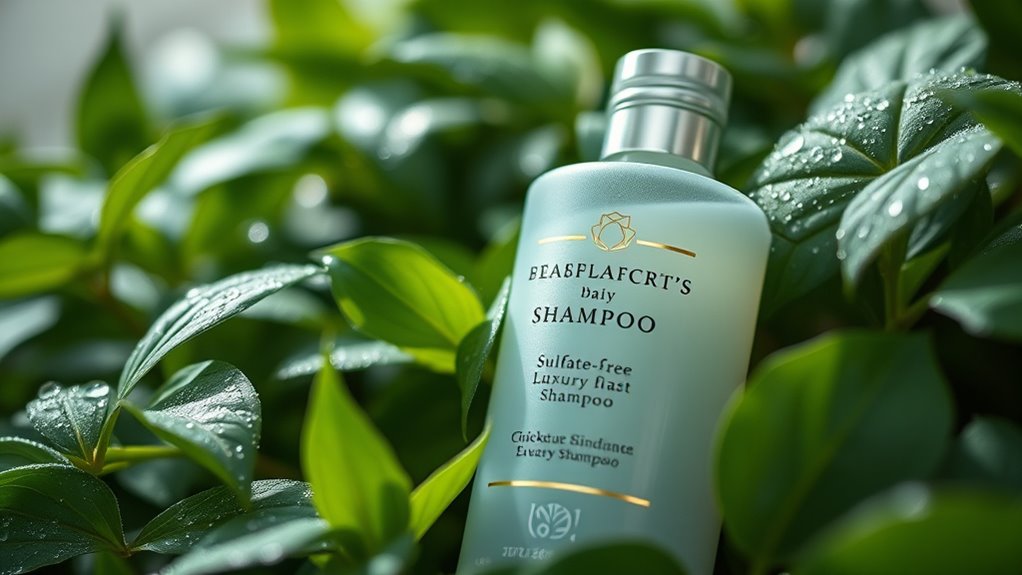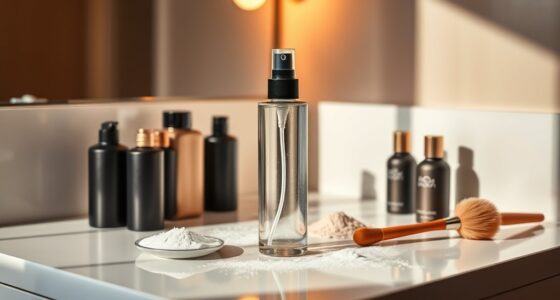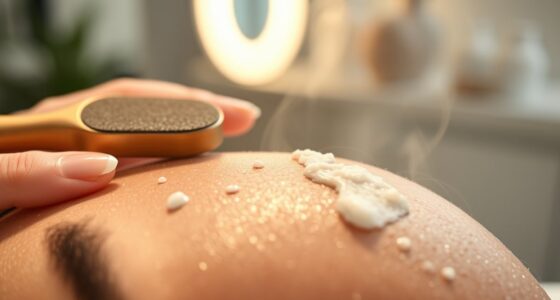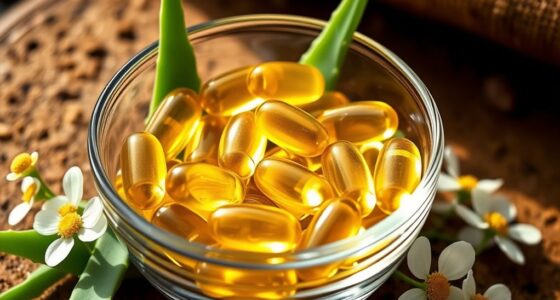Sulfate-free luxury shampoos are marketed as gentle, nourishing options that protect your hair’s health and color, but their true effectiveness depends on formulation quality rather than just hype. While many formulas include nourishing plant oils and antioxidants, not all are equally gentle or effective. If you’re looking to maintain color or have sensitive scalp, choosing the right product matters. To discover what works best for your hair, keep exploring the factors that influence these claims.
Key Takeaways
- Luxury sulfate-free shampoos often contain nourishing natural oils and antioxidants that promote hair health and shine.
- They are gentler and better suited for sensitive scalps, dry, curly, or color-treated hair, reducing dryness and irritation.
- Effectiveness varies by formulation; some may not cleanse as thoroughly, especially for oily or heavily styled hair.
- Marketing emphasizes benefits like hydration and damage repair, but results depend on individual hair type and needs.
- While beneficial for specific hair concerns, they are not a universal miracle cure but a targeted, gentle alternative to traditional sulfates.
What Are Sulfates and How Do They Work in Hair Care
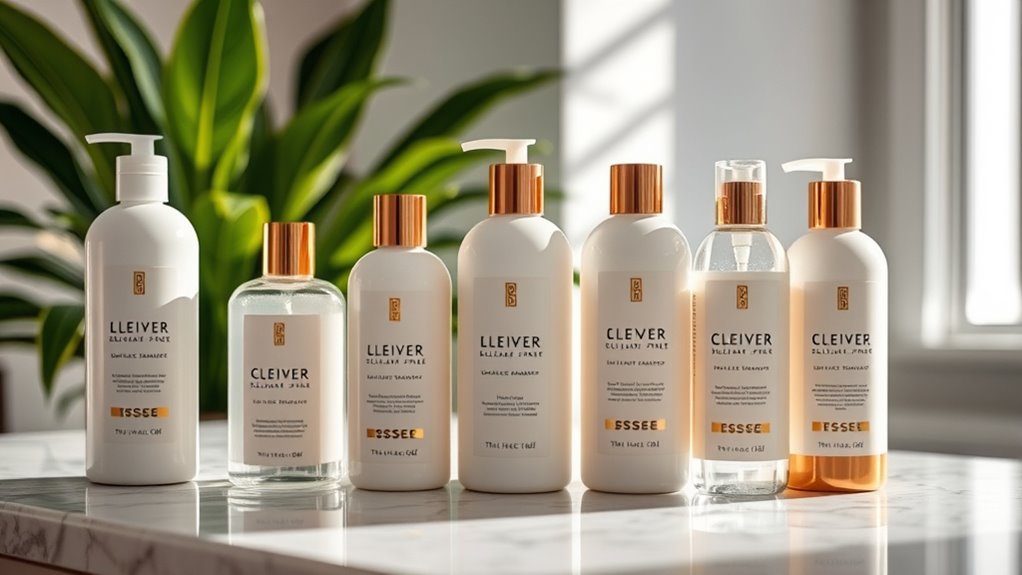
Sulfates are surfactants like sodium lauryl sulfate (SLS) and sodium laureth sulfate (SLES) that are commonly found in shampoos. These cleansing ingredients create lather by lowering water’s surface tension, helping to remove oil and dirt from your hair and scalp. They’re especially effective at breaking down sebum and product buildup, making them popular in deep-cleaning formulas. However, because sulfates are strong cleaners, they can strip away your hair’s natural oils, leading to dryness and irritation—particularly if you have sensitive skin or dry hair. The impact of sulfates varies depending on your hair type and how often you wash. While they boost cleansing power, they might also cause over-cleansing, which affects the health of your scalp and hair over time. Understanding the role of cleansing agents can help you decide whether sulfate-free shampoos are a better choice for your hair care routine. Additionally, some hair types respond better to gentle cleansers, making sulfate-free options a preferable alternative for maintaining hair health. Moreover, sulfate-free formulations often include milder surfactants that preserve natural oils and reduce irritation. Recognizing the potential for irritation caused by sulfates can guide consumers toward safer and more nourishing hair care options. Newer formulation technologies are also being developed to enhance cleansing efficacy while minimizing harsh effects.
The Pros and Cons of Using Sulfate-Containing Shampoos
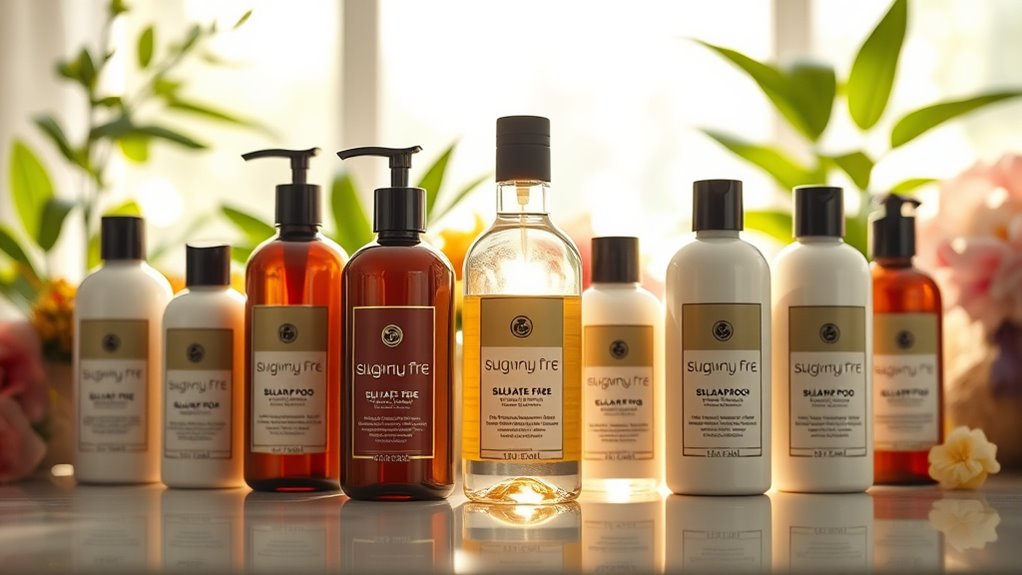
Using sulfate-containing shampoos offers the benefit of effectively removing excess oil, dirt, and product buildup, which makes them especially suitable for oily scalps. The rich lather they produce enhances the cleansing experience and provides a perception of thorough cleanliness. However, sulfates can strip away natural oils, leading to dryness, frizz, and potential irritation, particularly with frequent use. They may also accelerate color fading, especially in color-treated hair, due to their strong cleansing action. For scalp sensitivity or damaged hair, sulfates can compromise hair health and cause discomfort. While they deliver a deep clean, their harsh nature can leave your hair feeling dry and vulnerable, making it essential to weigh these pros and cons before choosing sulfate-based shampoos. Additionally, sulfates can disrupt scalp oil balance, which may contribute to dryness and irritation over time. This disruption can also affect the sebum production, potentially leading to either excess oil or dryness depending on individual scalp responses. Moreover, choosing sulfate-free shampoos can help maintain natural oils and promote healthier hair over time. Regular use of gentler, sulfate-free formulas can support the scalp’s natural oil regulation, reducing the risk of imbalance. Incorporating scalp health into your hair care routine can further enhance overall hair condition and comfort.
Do Sulfates Affect Hair Color and Longevity of Dye
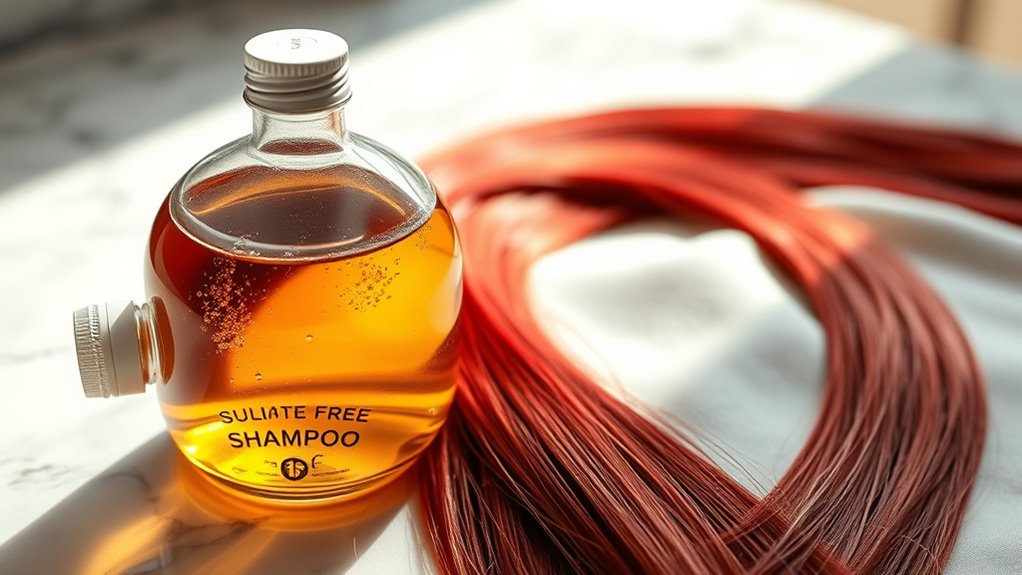
Sulfates can accelerate color fading by stripping dye molecules from your hair, especially in formulas with higher surfactant levels. The formulation of your shampoo, including pH balance, also plays a key role in how long your color lasts. Keep in mind that water exposure alone can cause fading, but sulfates tend to worsen the effect. Additionally, balanced diet and hydration support healthier hair, which can help retain color longer. Using sulfate-free shampoos can further minimize color loss and promote vibrant, longer-lasting results. Being aware of ingredient sensitivities can also help you choose the best products for maintaining your hair color. Understanding the hair’s porosity is also crucial, as more porous hair tends to lose color more quickly. Proper hair care routines tailored to your hair type can also significantly impact color retention and overall hair health.
Sulfates and Color Fading
While sulfates like sodium lauryl sulfate are effective cleansers, they can also strip away color molecules from dyed hair, leading to faster fading. High sulfate loads and imbalanced pH levels increase the risk of color loss during washing. Even sulfate-free shampoos might cause fading if they contain other cleansing agents that remove color pigments. The impact on color longevity depends more on formulation factors such as surfactant load, pH balance, and added color-protecting ingredients than sulfates alone. Additionally, certain antioxidants found in some shampoos can help protect hair color from oxidative damage during cleansing, emphasizing the importance of formulation quality in maintaining color vibrancy. Incorporating pH balancing ingredients can further reduce the risk of color fading by ensuring the shampoo’s pH remains within a hair-friendly range. Moreover, formulation techniques aimed at reducing harsh cleansing agents can also play a vital role in preserving hair dye. Furthermore, gentle cleansing methods can help extend the life of hair color by minimizing damage during washing.
Formulation and Water Exposure
Water exposure alone can cause hair color to fade over time, regardless of the shampoo you choose. The key lies in the shampoo formulation—specifically, how surfactants, pH balance, and cleansing strength interact with water. A well-designed shampoo minimizes color loss by balancing these factors. Choosing the right ingredients also plays a crucial role in protecting color during water exposure. Additionally, the interaction between ingredients and algorithms in product formulation can influence how effectively a shampoo preserves color. Proper formulation considers formulation stability, ensuring that the product maintains its efficacy over time. – Formulation influences how gentle or harsh the shampoo is on color, with some formulations better suited to color retention. – water exposure naturally contributes to fading, but the shampoo’s surface tension and cleansing power determine how much pigment is stripped. – pH-balanced shampoos help maintain cuticle integrity, protecting color longer. Choosing a shampoo with an ideal formulation, regardless of sulfate content, can markedly extend your hair color’s longevity and improve overall color retention during regular water exposure.
Are Sulfate-Free Shampoos Truly Gentle or Just a Marketing Gimmick
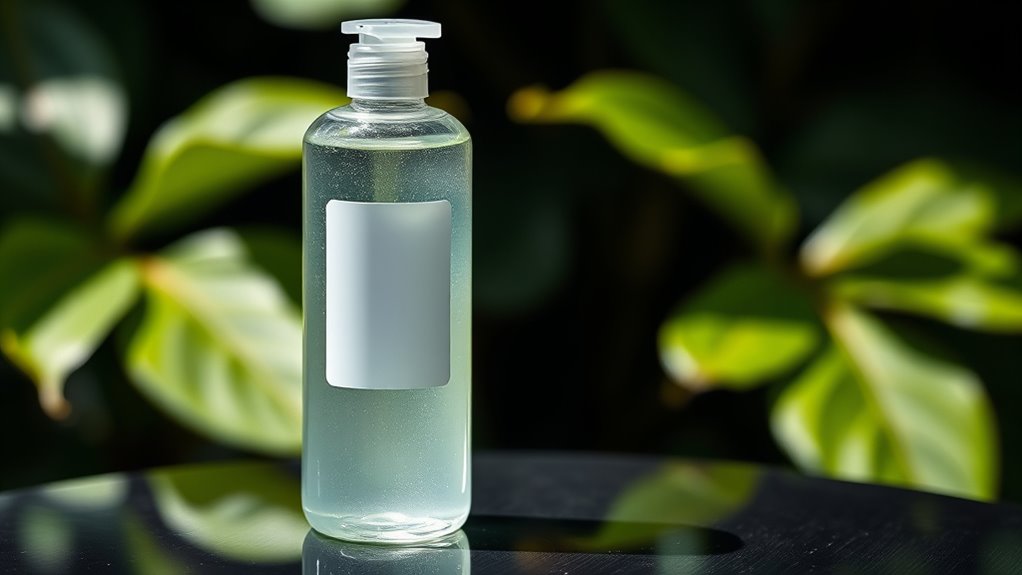
Many brands promote sulfate-free shampoos as gentler alternatives, but their true effectiveness depends on more than just the absence of sulfates. A truly gentle formulation uses alternative surfactants that cleanse without irritating your scalp or stripping moisture. However, marketing often highlights the sulfate-free label to appeal to sensitive scalp sufferers, which can be misleading. Some sulfate-free products contain other harsh ingredients or surfactants that may irritate or cause buildup, challenging the idea that they’re inherently gentle. The perceived gentleness varies based on individual scalp sensitivity and the specific ingredients in the formulation. Ultimately, whether these shampoos are genuinely gentle or just a marketing gimmick hinges on their complete ingredient list and how well they meet your hair and scalp needs.
How to Choose the Best Shampoo for Your Hair Type and Needs
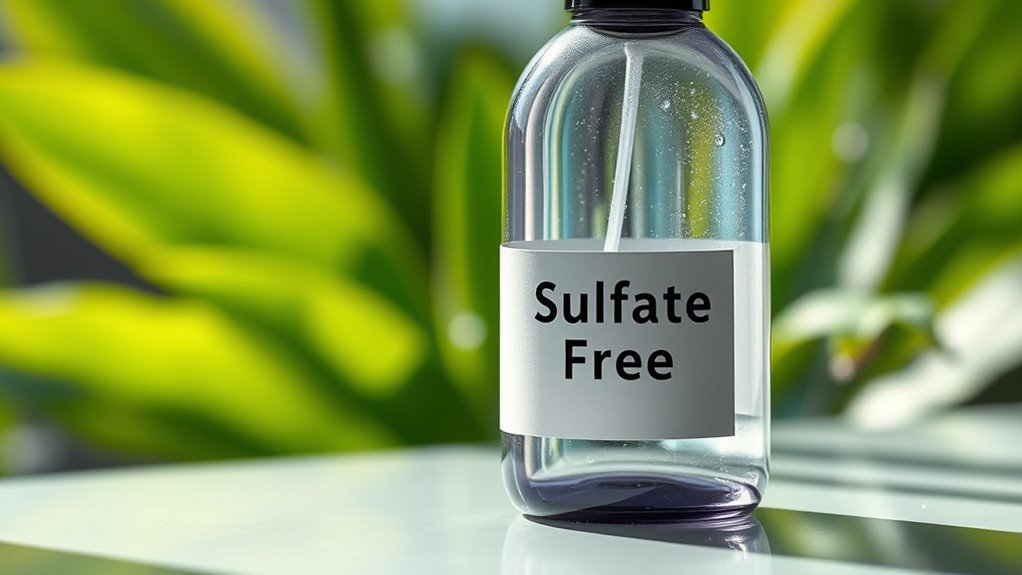
Choosing the right shampoo begins with understanding your hair type and specific needs. For fine hair, look for volumizing formulas, while dry or curly hair benefits from hydrating options. If you color-treat your hair, opt for sulfate-free shampoos with color-preserving ingredients to reduce fading. For sensitive scalp or skin, select sulfate-free formulas that avoid harsh detergents and include soothing components. Consider your hair concerns, such as scalp detox or moisture retention, to find the best match.
- Match shampoos to your hair type and needs for targeted cleansing and moisture retention
- Use sulfate-free options for color protection and sensitive scalp comfort
- Evaluate ingredients like amodimethicone or charcoal to address specific hair concerns
The Role of Surfactants in Maintaining Hair Health and Appearance
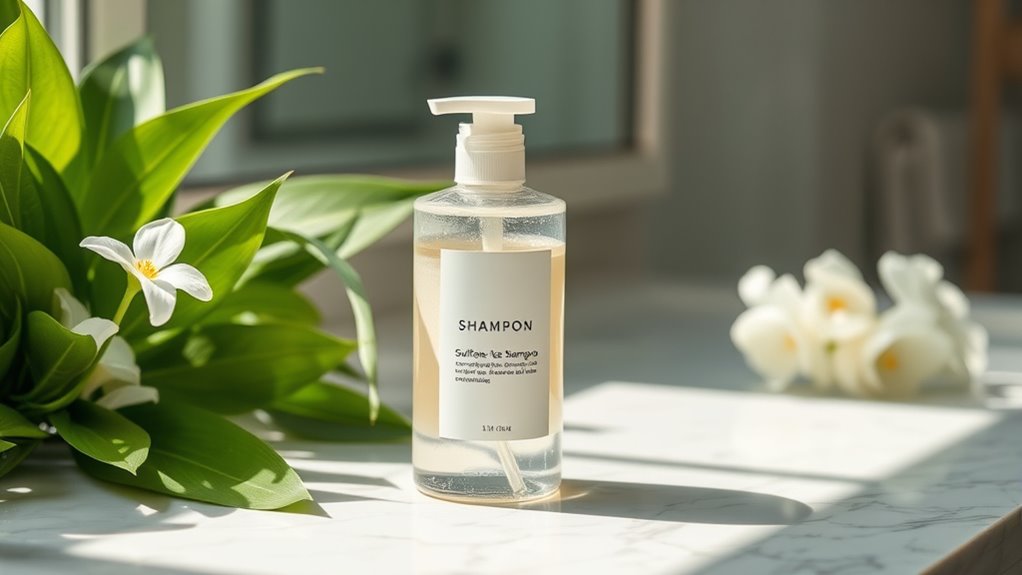
Surfactants are the key ingredients responsible for creating lather and effectively cleansing your hair and scalp. Sulfates, like sodium lauryl sulfate, are common surfactants that lower surface tension, helping water rinse away oils, dirt, and buildup. Proper formulation of surfactants ensures thorough cleansing without stripping too much natural oil, which keeps your hair healthy and shiny. However, harsh surfactants can lead to dryness, frizz, and scalp irritation if not carefully balanced. The overall impact on hair health depends on the surfactants’ chemical structure, concentration, and compatibility with nourishing ingredients. Choosing shampoos with well-formulated surfactants helps maintain your scalp’s natural oils and promotes a clean, vibrant look without compromising hair integrity or causing irritation.
Common Ingredients in Luxury Sulfate-Free Shampoos and Their Benefits

Luxury sulfate-free shampoos feature a variety of plant-based extracts and nourishing ingredients that enhance hair health without harsh chemicals. These formulations often include natural oils like coconut, marula, and Moringa seed oil, which provide deep hydration, shine, and scalp soothing benefits. Ingredients such as argan oil, jojoba, and aloe vera deliver nourishment and help maintain the hair’s natural moisture balance. Added antioxidants like vitamin E and green tea extract protect hair from environmental damage, promoting a healthier appearance. Some formulas incorporate unique ingredients like honey or blue tansy for calming the scalp and offering restorative effects.
Luxury sulfate-free shampoos nourish hair with plant extracts, natural oils, and antioxidants for shine, hydration, and scalp comfort.
- Hydration and nourishment support healthy, resilient hair.
- Antioxidants shield hair from environmental stressors.
- Scalp soothing ingredients promote comfort and balance.
Do Water Exposure and Formulation Play a Bigger Role in Color Fading
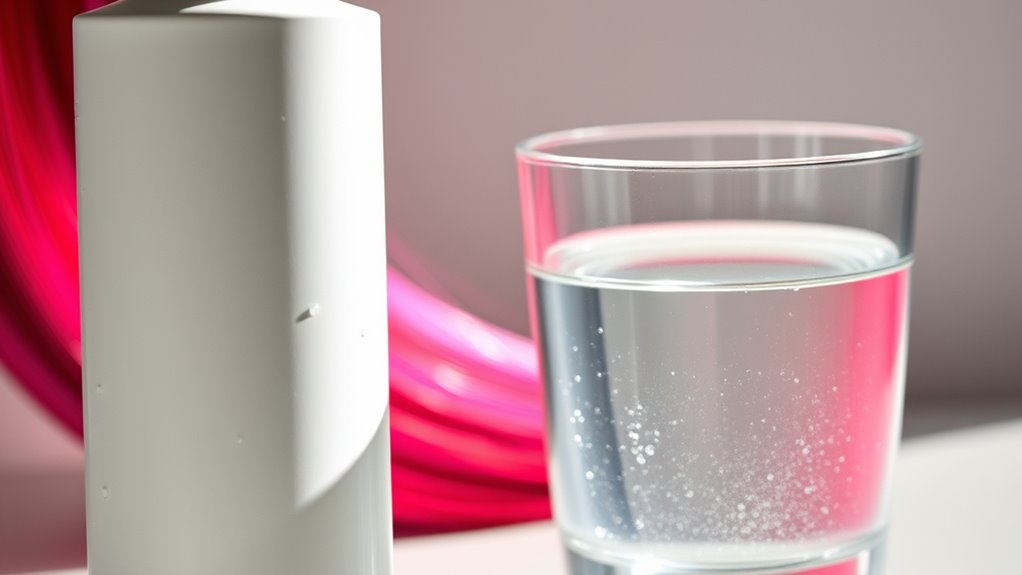
While natural ingredients in sulfate-free shampoos promote hair health, understanding how water exposure and formulation impact color retention is vital. Water exposure alone can cause noticeable color fade, similar to sulfate shampoos. The formulation’s pH influences dye retention; higher pH can increase dye leaching. Surfactants and surface tension affect how aggressively color molecules are stripped. Ingredients like chelating agents and conditioners help protect color by reducing surface tension and damage. The table below highlights key factors:
| Factor | Effect | Impact on Color Fade |
|---|---|---|
| Water exposure | Causes dye leaching | Accelerates fading |
| pH level | Alters dye retention | Higher pH increases fade |
| Surfactant load | Affects surface tension | More surfactant, more fade |
| Chelating agents | Minimize surface damage | Protects color retention |
| Formulation balance | Influences color fade | Critical for longevity |
Practical Tips for Preserving Color-Treated Hair While Using Any Shampoo
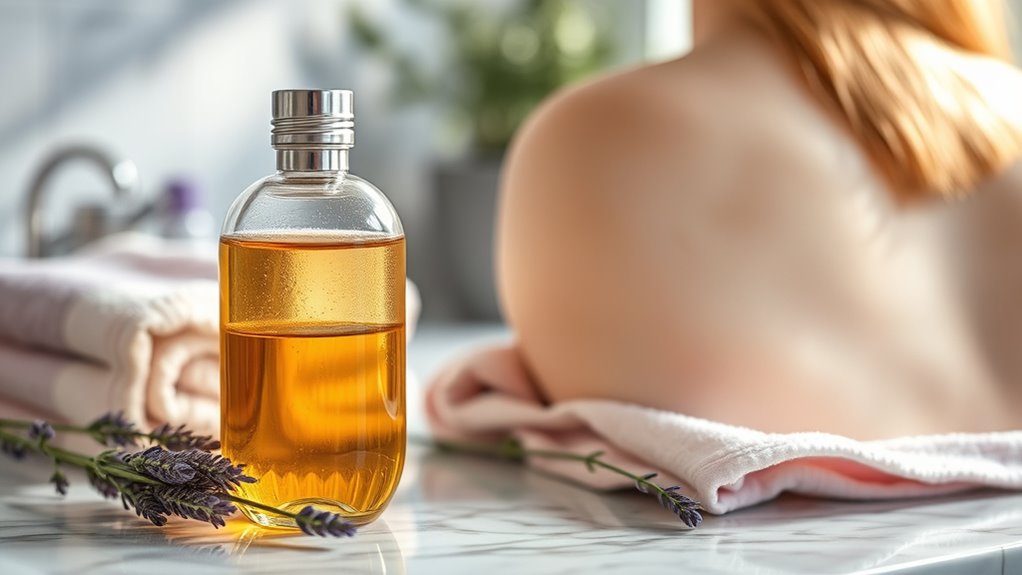
To keep your color-treated hair vibrant, limit water exposure and wash less often—aim for 2-3 times a week. Use shampoos formulated for color protection and always focus on your scalp, avoiding mid-lengths and ends. Protect your hair from environmental damage with UV and heat shields to preserve your color longer.
Limit Water Exposure
Limiting water exposure is essential for preserving the vibrancy of color-treated hair. Excessive water contact can wash out dye molecules, accelerating color fading. To protect your hair’s color, use dry shampoo between washes to absorb oil and dirt, reducing the need for frequent washing. Wearing a swim cap or rinsing with cool water after swimming minimizes water penetration, preventing color loss. Applying leave-in conditioners and heat protectants creates a barrier against environmental damage and water, helping maintain color vibrancy. Regular scalp treatments support overall hair health, decreasing the necessity for water-based cleansing. By controlling water exposure, you preserve your hair’s color and prolong the effects of your salon treatment.
- Use dry shampoo to extend time between washes
- Rinse with cool water after swimming to reduce water contact
- Incorporate leave-in conditioners and scalp treatments
Use Color-Safe Products
Using color-safe products is a key step in maintaining vibrant, long-lasting hair color. Look for sulfate-free shampoos labeled as “color-safe” or “gentle,” as these formulas help reduce pigment loss caused by harsh detergents. A pH-balancing shampoo minimizes color fading during cleansing, protecting your hair’s hue. When washing, focus shampoo application on your scalp, avoiding mid-lengths and ends to prevent unnecessary stripping of color. Incorporate conditioners and treatments formulated for color protection to further extend your hair’s vibrancy. Rinsing with cool water after shampooing also helps lock in color. By choosing the right products and following these simple tips, you’ll preserve your hair color’s brilliance and enjoy longer-lasting, beautiful results.
Minimize Shampoo Frequency
Reducing how often you shampoo your hair is one of the most effective ways to preserve your color-treated locks. Limiting shampoo frequency to 2-3 times weekly minimizes pigment removal caused by surfactants, especially with sulfate-free formulas designed for gentle cleansing. Between washes, consider co-washing or using conditioner-only methods to extend time without shampooing, which helps maintain color vibrancy. Using dry shampoo can also reduce water exposure, further preventing color fading. When you do shampoo, focus on the scalp, avoiding mid-lengths and ends to avoid stripping essential oils and color. Remember, hot water can accelerate fading; opt for lukewarm water instead. By adopting a strategic hair care routine, you preserve your color and keep your hair looking vibrant longer.
Making an Informed Decision: Do You Need Sulfate-Free for Your Hair?
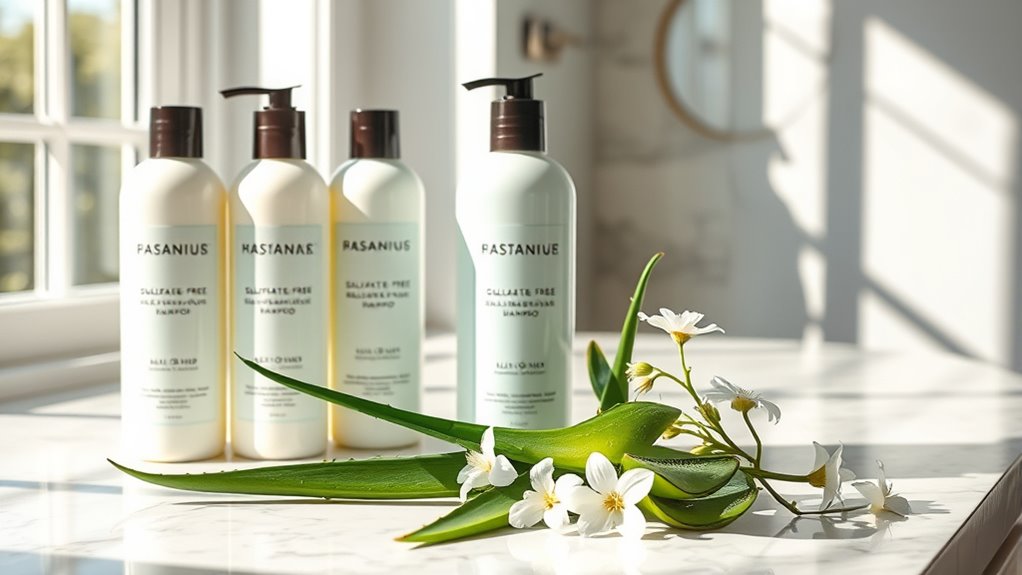
Deciding whether you need sulfate-free shampoo depends on your individual hair and scalp characteristics. If you have sensitive skin, dry or curly hair, or color-treated hair, a sulfate-free formulation may be beneficial for gentle cleansing and maintaining hair health. Conversely, if you have an oily scalp or layered hair that needs thorough cleansing, traditional sulfate shampoos might be more effective, though they can strip moisture. Consider these factors:
| Hair Type | Scalp Sensitivity | Hair Treatment Needs |
|---|---|---|
| Dry, Curly | Sensitive, prone to dryness | Color-treated, damaged |
| Oily, layered | Less sensitive, oily | No color treatment |
| Normal | Mild sensitivity | Regular cleansing |
| Fine, straight | Sensitive or not | Volume enhancement |
| Thick, coarse | Sensitive or not | Deep cleansing |
Your choice hinges on your specific needs and how your hair responds to different formulations.
Frequently Asked Questions
Are Sulfate-Free Shampoos Actually Better?
You wonder if sulfate-free shampoos are truly better. While they’re gentler, especially for sensitive or color-treated hair, they don’t necessarily cleanse more effectively. You might notice less dryness and irritation, but some formulas lather less, making you feel like they’re not cleaning well. Ultimately, whether they’re better depends on your hair type and scalp needs. For many, they’re a healthier choice, but they’re not a miracle for everyone.
Does Sulfate Free Shampoo Promote Hair Growth?
You might wonder if sulfate-free shampoo promotes hair growth. While it doesn’t directly stimulate growth, it creates a healthier scalp environment by reducing irritation and dryness. This can help prevent breakage and shedding, supporting healthier hair over time. Plus, many formulas include nourishing ingredients like biotin or keratin that strengthen hair. So, while it’s not a miracle cure, using sulfate-free shampoo can contribute to better hair health overall.
What Are the Disadvantages of Sulphate-Free Shampoo?
You might notice that sulfate-free shampoos can be less foamy, making it tricky to tell if your hair’s truly clean. They may not remove heavy product buildup as well as regular shampoos, and you might need to wash more often or longer for the same results. Additionally, if your scalp is oily, some sulfate-free formulas might not cleanse as effectively, leaving your hair feeling greasy or less fresh.
What Happens to Your Hair When You Stop Using Sulfates?
When you stop using sulfates, your hair retains more natural oils, which helps reduce dryness and frizz over time. At first, it might feel less clean or oilier as your scalp adjusts, but your scalp health improves by lowering irritation and preserving protective oils. Plus, your color lasts longer, and your hair becomes shinier, softer, and easier to manage, especially if it’s curly, damaged, or sensitive.
Conclusion
Ultimately, choosing between sulfate-free or traditional shampoos is like selecting a gentle breeze or a invigorating splash—both have their charm. By understanding your hair’s unique needs and paying attention to formulation subtleties, you can nurture your locks like a treasured garden. Whether you opt for the luxe whisper of sulfate-free options or the reliable comfort of classic formulas, trust your instincts to keep your hair vibrant and healthy—your reflection’s best-kept secret.
